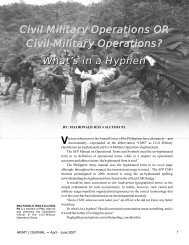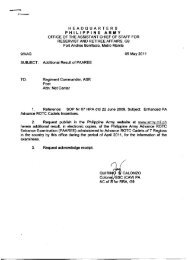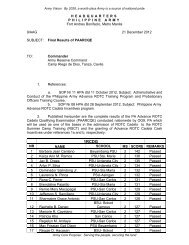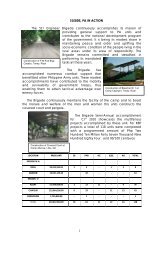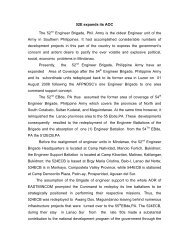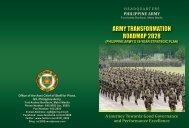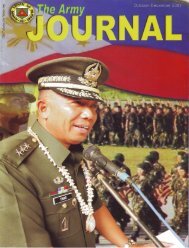202 Article-final - Philippine Army
202 Article-final - Philippine Army
202 Article-final - Philippine Army
Create successful ePaper yourself
Turn your PDF publications into a flip-book with our unique Google optimized e-Paper software.
T<br />
He current mission of <strong>202</strong> nd Infantry (Unifier)<br />
Brigade is to conduct SUPPORT<br />
OPERATIONS (to win the peace) with all<br />
Stakeholders (SH) to gain people’s support<br />
and clear the AOR from CNN influence and coercion in<br />
order to create an environment conducive to<br />
sustainable development. We will achieve this by<br />
engaging all SH by utilizing “Cooperation<br />
Management Strategy”. The strategy is conducted in<br />
order to generate support from stakeholders (SH) and<br />
immensely contribute to the accomplishment of the<br />
unit’s mission.<br />
Part of this is our efforts to the IP communities along<br />
Sierra Madre Range of Infanta, General Nakar and Real<br />
all of Quezon as well as the IP communities from Rizal<br />
Province. For the previous years the CNN have been<br />
recruiting red fighters from the IP communities of Rizal<br />
and Quezon Province that increased up to a platoon<br />
size formation. Commercialization is one of the the<br />
primary issue that the NPA exploits to entice the IPs to<br />
join the armed movement.<br />
In order to counter the CNN recruitments in the IP<br />
communities, this unit recommended and initiated the<br />
deployment of TRIBO intended for the IP communities.<br />
Follow-on activities for IP were also undertaken by this<br />
unit particularly the Youth Leadership Summit (YLS)<br />
exclusive for the IP youth; and the conduct of the Tribal<br />
Chieftains Leadership Summit for the IP leaders.<br />
BACKGROUND<br />
The Dumagats are one of the major groups of<br />
indigenous people living in the Southern Tagalog<br />
region east of Manila. The Dumagats, now numbering<br />
only about 30,000, inhabit the fertile Sierra Madre<br />
Ranges on Quezon province's northern tip. A large<br />
Engaging Dumagat Tribes<br />
Cpt Gene R Orense (Inf) PA<br />
throng of this ethnic tribe can be found in the town of<br />
General Nakar, while a few of them can be spotted in<br />
three municipalities of Polillo island.<br />
Despite the passage of the Indigenous Peoples Rights<br />
Act (IPRA) in 1997, conflicts still crop up between<br />
the tribal communities and what community organizers<br />
say are their modern-day colonizers-foreign capitalist<br />
investors, big landholders and government itself.<br />
Primarily, the Dumagats depend on farming, kaingin,<br />
paid labor, vending logs and other forest commodities<br />
as livelihood. Secondarily, they rely on fishing, hunting<br />
animals, gathering crops and other natural bounties for<br />
survival. Loan dependence has reduced many of them<br />
to dismal poverty. Despite the government’s allocation<br />
of 47 resettlements for Dumagats, they still practiced<br />
nomadic way of living which brought them deep into<br />
different parts of Sierra Madre.<br />
Commercialization and developmental projects in some<br />
Tribal communities, ancestral domain intensified the<br />
conflict between the IPs and entrants which include the<br />
government. Through the tribal organizations,<br />
organizing groups of the Southern Tagalog Regional<br />
Party Committee (STRPC) used and exploited issues to<br />
gain the support and stage mass protest and<br />
demonstrations against the government. Some of<br />
these issues are as following:<br />
1) Construction of Laiban Dam Project in the boundary<br />
of municipalities of Tanay and Gen. Nakar which<br />
affected seven (7) barangays<br />
2) Brutal killings and abductions of tribal leaders<br />
allegedly committed by Armed Forces of the <strong>Philippine</strong>s<br />
3) Militarization due to the presence of military troops in<br />
the IP community
TRIBO<br />
Through the series of consultations made by the AFP<br />
SOT Center to COL AURELIO B BALADAD INF (GSC)<br />
PA, Commander, <strong>202</strong> ND Infantry Brigade, 2ID, PA,<br />
SOT-IP immersions in the identified Tribal communities<br />
at So Malatunglan, Barangay Sablang, Gen Nakar,<br />
Quezon; Barangay Lower Lumutan, Gen Nakar Quezon<br />
and Brgy Manggahan, Daraitan, Tanay, Rizal were<br />
made. Prior to the immersions, the 2 nd Infantry Division<br />
Training Unit conducted a SOT-IP training to operators<br />
in which they will spend two (2) weeks of theoretical<br />
training and (15) weeks of immersion to identified IP<br />
areas.<br />
The students were divided into two (2) groups, the 1IBn<br />
elements were deployed at So Malatunglan, Barangay<br />
Sablang, Gen Nakar, Quezon and the 16IBn elements<br />
were deployed at Barangay Lower Lumutan, Gen<br />
Nakar, Quezon and Manggahan, Daraitan, Tanay,<br />
Rizal. The students were able to apply their knowledge<br />
during the immersion with the Indigenous People in<br />
their respective areas.<br />
During the immersion phase, the students have<br />
facilitated community developmental projects and<br />
programs such as construction of public comfort room,<br />
basketball court (half), conduct of Alternative Learning<br />
System and rattan basket making seminar. They also<br />
conducted series of consultation, dialogue and forums<br />
discussing the issues of the Dumagats/Remontados<br />
particularly Ancestral Domain and effects of<br />
urbanization and commercialization.<br />
However, due to limited immersion time in the IP<br />
communities, the SOT-IP operators were not able to<br />
unearth probable politico-military structure and coopted<br />
the CNN sympathizers and supporters. Nevertheless,<br />
the operators gained the full support of the IPs as a<br />
result, there were no IP recruited by the CNN as of this<br />
date.<br />
The Youth Leadership Summit (YLS) for IPs was<br />
conducted last 2-4 June 2010 at Headquarters 1 st<br />
Infantry Battalion, <strong>202</strong>IBD, 2ID, PA. The activity was<br />
participated by 120 youth from IP communities of Rizal<br />
and North Quezon Provinces. The objectives of the<br />
activity are: to develop youth leaders who share a<br />
common vision for peace; to boost youth leaders<br />
empowerment and leadership; to foster volunteerism,<br />
environmentalism and social responsibility; to conduct<br />
activities focused on sustainable community<br />
development efforts and to enhance closer relationship<br />
with the Creator<br />
The modules of the YLS were as follows:<br />
(a) Leadership module<br />
(b) Development & interpersonal communication<br />
module<br />
(c) Environmental awareness & concerns<br />
(d) Barangay awareness module<br />
(e) Preventing drug addiction & criminality<br />
(f) Value enhancement<br />
(g) Workshop on action planning<br />
The modules were designed to develop the IP youth<br />
leadership potentials as well as their inter and intra<br />
personal skills. Four (4) tribal elders accompanied the<br />
IP youth as part of their cultural traditions.<br />
The first day of the youth summit facilitated by YLS<br />
alumni and invited instructors from Al Ian Barcelona<br />
(AIB) Training Group from Metro Manila were focused<br />
on team building activities. Mr Al Ian Barcelona lectured<br />
on Leadership 101 in which he emphasized the<br />
leadership capabilities within individuals. The AIB team<br />
also facilitated spiritual reflection in which Mr Barcelona<br />
and his team intends to enhance the closer relationship<br />
between the participants and the Creator.<br />
One of the highlights of the youth summit is an<br />
educational tour which was done in the different<br />
significant cant places in Laguna Province. First stop<br />
was the birth place of our national hero Dr Jose Rizal at<br />
Calamba, Laguna. The participants were given ideas<br />
on the life of Jose Rizal thru the displayed antiques in<br />
his ancestral house. They were briefly lectured about<br />
the significant role made by Jose Rizal in fighting for our<br />
freedom. Next stop was at UP where the youth saw the<br />
different products made out of rattan and bamboo at<br />
Ecosystems Research and Development Bureau of<br />
DENR at Los Banos grounds. Forester Gregorio Santos<br />
and other scientists from ERDB, DENR explained to the<br />
participants the benefits of rattan and bamboo<br />
propagation in line with forest conservation and<br />
preservation in the environment protected areas in the<br />
country. The group also visited the Museum of Natural<br />
History in UPLB grounds in which the youth participants<br />
viewed the different species of plants and animals<br />
found in country and other neighboring ASIAN<br />
countries. To conclude the participants were ferried to<br />
Sun Star Mall at Sta Cruz, Laguna in which majority of<br />
the IP youth gained a initial experience in a Mall. The<br />
youth were given a chance to enjoy computer games<br />
and other amusement inside the World of Fun Section<br />
of said mall.<br />
On culmination, an action planning workshop was
conducted in order for the participants to lay down the<br />
proposed activities and programs of the youth in their<br />
respective communities. NCIP provincial coordinators<br />
from Rizal and Quezon and representatives from<br />
the LGUs from Tanay, Rizal and Gen. Nakar, Quezon<br />
were among the panels in the workshop.<br />
Due to the success of the Youth Leadership Summit<br />
for the IPs last 2-4 June 2010, this unit conducted a<br />
Tribal Chieftains Leadership Summit (TCLS) as a follow<br />
-on activity for the IPs targeting the Tribal Chieftains<br />
and elders of the IP communities of Rizal and North<br />
Tribal Chieftains Leadership Summit (TCLS)<br />
Quezon Provinces. The activity was conducted last 11-<br />
13 April 2011 and was attended by 91 Tribal Chieftains,<br />
Tribal Council members and four (4) Tribal Governors<br />
from the IP communities of the Provinces of Rizal and<br />
Quezon. These personalities are the recognized<br />
community leaders and key communicators of the natives.<br />
The objectives of the Summit are:<br />
1) To develop the leadership skills of the IP leaders;<br />
2) To foster volunteerism, environmentalism and social<br />
responsibility;<br />
3) To conduct activities focused and aligned with the IP<br />
Community’s own concept of sustainable community<br />
development;<br />
4) To enable the IP leaders to chart their own future<br />
in accordance to their culture and traditions.<br />
5) To prevent LT recruitment in the IP communities;<br />
and<br />
6) To win over the sympathy and support of the IP<br />
leaders for the government.<br />
CONCLUSION<br />
The engagement with the IP communities reduced the<br />
number of red fighters from a sized-formation into two<br />
(2) regular members. Most of the CT members went on<br />
lie-low and some IP red fighters voluntarily surrendered<br />
to the tribal elders who subsequently turned them over<br />
to the military.<br />
The degree of success of engaging the IP thru the<br />
Tribal Chieftain’s Leadership Summit immediate as it<br />
resulted to the surrender of Mr Ryan V Marcelino @<br />
Pering/Furton/Gilbert/Gigs/Angkol. Ryan V Marcelino<br />
was believed to operating Rizal province both in the<br />
Red and White areas under KLG 53 KOMPROB RIZAL.<br />
The activities such as the TCLS increased the<br />
leadership skills of the tribal leaders who became more<br />
aware about the importance of protecting the<br />
environment, ensuing security and introducing<br />
developments. The group of tribal chieftains and<br />
Indigenous People who underwent the leadership<br />
summit will hopefully become a force multiplier and<br />
dynamic individuals in their communities.<br />
Although most are not formally educated, it is observed<br />
that the IP leaders are very much aware of the<br />
problems besetting their communities and are very<br />
articulate in presenting the causes, effects and possible<br />
solutions to their problems. They wished that they could<br />
be more involved in the formal decision making process<br />
of LGUs concerning the IPs.<br />
In summary, engaging the Dumagats and Remontado<br />
tribes further gained the overall support of the populace<br />
particularly in the IP communities along Sierra Madre<br />
range. IP leaders became aware of their significant role<br />
in attaining peace in their community. Thus, it is also<br />
the responsibility of the local government to further<br />
deliver community development projects and programs<br />
for the IP.



